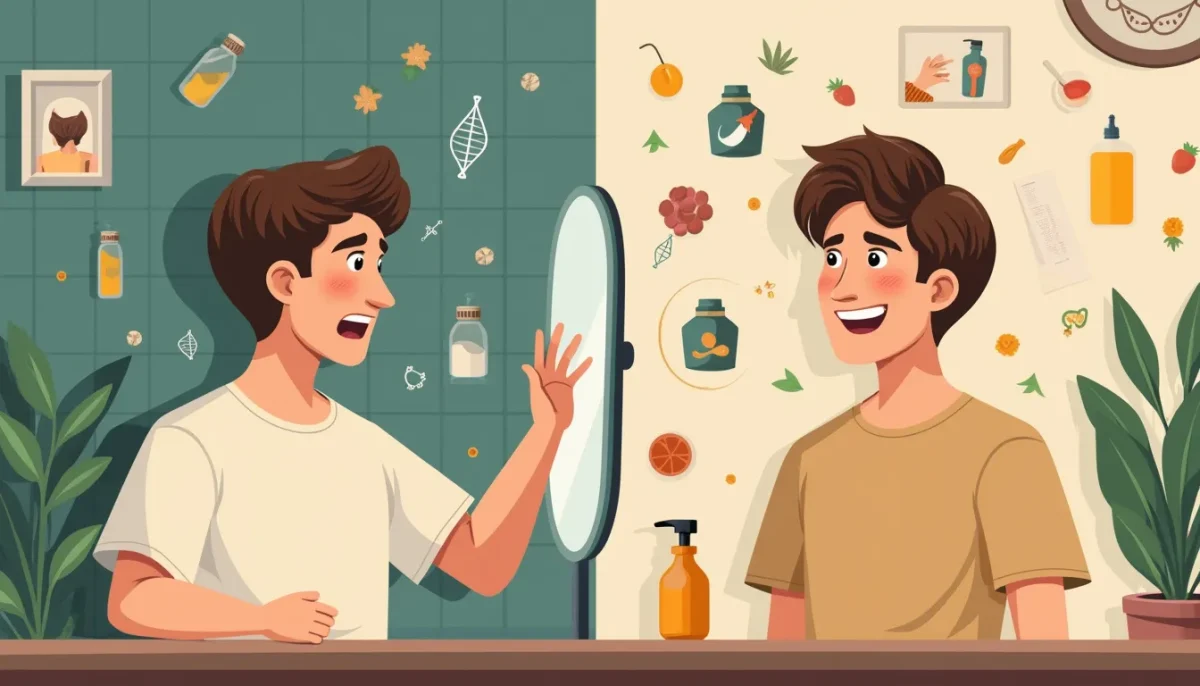Are you noticing more hair in your brush or shower drain lately? You’re not alone. Early hair loss is a common concern that affects millions of people worldwide, regardless of age or gender. While it’s normal to shed 50-100 hairs a day, excessive hair loss can be distressing and impact our self-confidence. Whether you’re in your twenties or approaching middle age, understanding the causes of premature hair thinning and exploring effective solutions is crucial. In this comprehensive guide, we’ll delve into the various factors contributing to early hair loss, from genetics to lifestyle choices, and explore a range of strategies to combat this issue. From cutting-edge medical treatments to natural remedies and styling tricks, we’ll equip you with the knowledge to take control of your hair health. So, if you’re ready to uncover the secrets to maintaining a full, healthy head of hair, keep reading. Your journey to luscious locks starts here!
Causes of Early Hair Loss
Early hair loss can be a distressing experience, especially when it occurs unexpectedly or at a young age. Understanding the root causes of this condition is crucial for developing effective strategies to combat it. Let’s dive into the various factors that contribute to premature hair thinning and shedding.
Genetic Factors: The Hereditary Hair Loss Puzzle
When it comes to early hair loss, genetics often play a starring role. You might have heard the old wives’ tale about inheriting baldness from your maternal grandfather, but the truth is a bit more complex. Both parents contribute to your genetic predisposition for hair loss.
The most common type of genetic hair loss is called androgenetic alopecia, also known as male or female pattern baldness. This condition affects up to 50% of men by age 50 and about 25% of women by age 65. But here’s the kicker – it can start much earlier, sometimes even in your teens or early twenties!
If you’re experiencing early hair loss, take a look at your family tree. Do you see a pattern of thinning hair or baldness? If so, you might be dealing with the genetic jackpot (or should we say, lack-pot?) of hair loss. But don’t worry, having the genes doesn’t mean you’re doomed to a life of hats and wigs. There are ways to slow down the process and even regrow some of that luscious locks!
Hormonal Imbalances: When Your Body’s Chemistry Goes Haywire
Hormones are like the body’s chemical messengers, and when they’re out of whack, your hair can pay the price. Both men and women can experience hormonal imbalances that lead to early hair loss. Let’s break it down:
- Testosterone and DHT: In men (and sometimes women), the hormone testosterone is converted to dihydrotestosterone (DHT). DHT can shrink hair follicles, leading to thinner, weaker hair that eventually stops growing.
- Thyroid issues: Both hypothyroidism and hyperthyroidism can cause hair loss. Your thyroid gland is like the body’s thermostat, regulating metabolism and other functions. When it’s not working properly, it can affect hair growth.
- Pregnancy and postpartum hormonal changes: Ladies, if you’ve recently had a baby, you might notice more hair in your brush. This is due to the dramatic hormonal shifts that occur during and after pregnancy.
The good news? Many hormonal imbalances can be treated, which may help slow or reverse hair loss. If you suspect a hormonal issue, it’s worth chatting with your doctor about getting your levels checked.
Nutritional Deficiencies: You Are What You Eat (And So Is Your Hair)
Your hair isn’t just a fashion statement – it’s a reflection of your overall health. And just like the rest of your body, your hair needs proper nutrition to thrive. Certain nutritional deficiencies can lead to early hair loss or thinning. Here are some key nutrients your hair craves:
- Iron: Iron deficiency anemia is a common cause of hair loss, especially in women.
- Vitamin D: This sunshine vitamin isn’t just for bones – it also plays a role in hair follicle cycling.
- B vitamins: Particularly biotin (B7) and B12, which are essential for healthy hair growth.
- Protein: Hair is made of protein, so not getting enough can lead to weaker, thinner strands.
- Zinc: This mineral is crucial for hair tissue growth and repair.
If you’re experiencing early hair loss, it might be time to take a closer look at your diet. Are you getting a balanced mix of nutrients? Consider talking to a nutritionist or your doctor about potential deficiencies and how to address them.
Stress and Lifestyle Factors: When Life Takes Its Toll on Your Tresses
In our fast-paced world, stress has become an unwelcome companion for many. But did you know that chronic stress can contribute to early hair loss? It’s true! When you’re stressed, your body goes into survival mode, redirecting resources away from non-essential functions like hair growth.
Stress-related hair loss, known as telogen effluvium, can occur months after a stressful event. It’s like your hair decides to take a vacation after you’ve been through the wringer. The good news? This type of hair loss is often temporary.
But stress isn’t the only lifestyle factor that can lead to early hair loss. Other culprits include:
- Poor sleep habits: Your body does a lot of repair work while you snooze, including hair growth.
- Smoking: It’s bad for your lungs, your skin, and yes, your hair too.
- Excessive alcohol consumption: Too much booze can lead to nutritional deficiencies that affect hair health.
- Harsh hair treatments: Over-processing, heat styling, and tight hairstyles can damage hair and lead to breakage.
The silver lining? Many of these factors are within your control. Making lifestyle changes can not only improve your overall health but may also help your hair make a comeback.
Medical Conditions and Treatments: When Your Health Affects Your Hair
Sometimes, early hair loss can be a sign of an underlying medical condition. Here are a few health issues that might be causing your hair to hit the road:
- Alopecia areata: An autoimmune disorder that causes patchy hair loss.
- Scalp infections: Such as ringworm, which can cause scaly patches and hair loss.
- Trichotillomania: A mental health condition characterized by an irresistible urge to pull out one’s hair.
- Lupus: An autoimmune disease that can cause hair loss as one of its symptoms.
Additionally, certain medical treatments can lead to hair loss as a side effect. Chemotherapy is perhaps the most well-known, but other medications can also cause hair thinning or shedding. These might include blood thinners, antidepressants, and some arthritis medications.
If you’re experiencing unexplained hair loss, especially if it’s accompanied by other symptoms, it’s important to consult with a healthcare professional. They can help identify any underlying conditions and recommend appropriate treatments.
Understanding the causes of early hair loss is the first step in addressing the issue. Whether it’s genetics, hormones, nutrition, stress, or a medical condition, knowing what you’re up against can help you develop a targeted approach to managing your hair health. And remember, you’re not alone in this journey – many people face early hair loss, and there are more solutions available than ever before.
Ready to take action against hair loss? Check out HairFortin, a comprehensive program designed to help stop hair loss and promote healthy hair growth. Don’t let early hair loss hold you back – take control of your hair health today!

